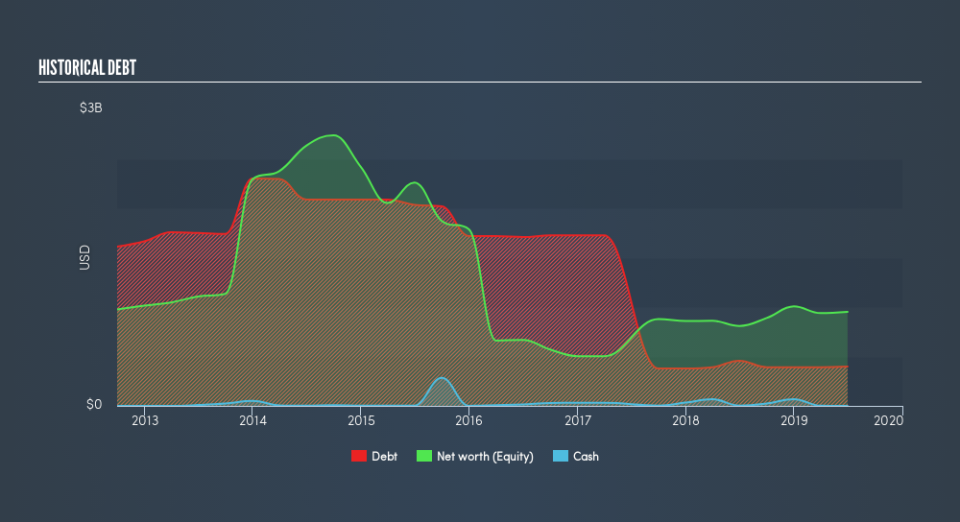Is Berry Petroleum (NASDAQ:BRY) Using Too Much Debt?

David Iben put it well when he said, 'Volatility is not a risk we care about. What we care about is avoiding the permanent loss of capital.' So it might be obvious that you need to consider debt, when you think about how risky any given stock is, because too much debt can sink a company. As with many other companies Berry Petroleum Corporation (NASDAQ:BRY) makes use of debt. But the real question is whether this debt is making the company risky.
When Is Debt A Problem?
Debt assists a business until the business has trouble paying it off, either with new capital or with free cash flow. If things get really bad, the lenders can take control of the business. While that is not too common, we often do see indebted companies permanently diluting shareholders because lenders force them to raise capital at a distressed price. Of course, plenty of companies use debt to fund growth, without any negative consequences. When we examine debt levels, we first consider both cash and debt levels, together.
Check out our latest analysis for Berry Petroleum
What Is Berry Petroleum's Net Debt?
You can click the graphic below for the historical numbers, but it shows that Berry Petroleum had US$397.3m of debt in June 2019, down from US$457.3m, one year before. And it doesn't have much cash, so its net debt is about the same.
How Strong Is Berry Petroleum's Balance Sheet?
According to the last reported balance sheet, Berry Petroleum had liabilities of US$134.5m due within 12 months, and liabilities of US$569.9m due beyond 12 months. On the other hand, it had cash of US$227.0k and US$54.9m worth of receivables due within a year. So its liabilities total US$649.3m more than the combination of its cash and short-term receivables.
This is a mountain of leverage relative to its market capitalization of US$695.6m. This suggests shareholders would heavily diluted if the company needed to shore up its balance sheet in a hurry.
In order to size up a company's debt relative to its earnings, we calculate its net debt divided by its earnings before interest, tax, depreciation, and amortization (EBITDA) and its earnings before interest and tax (EBIT) divided by its interest expense (its interest cover). Thus we consider debt relative to earnings both with and without depreciation and amortization expenses.
While Berry Petroleum's low debt to EBITDA ratio of 1.2 suggests only modest use of debt, the fact that EBIT only covered the interest expense by 6.5 last year does give us pause. So we'd recommend keeping a close eye on the impact financing costs are having on the business. Although Berry Petroleum made a loss at the EBIT level, last year, it was also good to see that it generated US$237m in EBIT over the last twelve months. When analysing debt levels, the balance sheet is the obvious place to start. But ultimately the future profitability of the business will decide if Berry Petroleum can strengthen its balance sheet over time. So if you're focused on the future you can check out this free report showing analyst profit forecasts.
But our final consideration is also important, because a company cannot pay debt with paper profits; it needs cold hard cash. So it's worth checking how much of the earnings before interest and tax (EBIT) is backed by free cash flow. In the last year, Berry Petroleum's free cash flow amounted to 23% of its EBIT, less than we'd expect. That's not great, when it comes to paying down debt.
Our View
At the end of the day, we're far from enamoured with Berry Petroleum's ability to handle its total liabilities or to convert EBIT to free cash flow. But the good news is that its solid interest cover gives us reason for some optimism. Once we consider all the factors above, together, it seems to us that Berry Petroleum's debt is making it a bit risky. Some people like that sort of risk, but we're mindful of the potential pitfalls, so we'd probably prefer it carry less debt. Given our hesitation about the stock, it would be good to know if Berry Petroleum insiders have sold any shares recently. You click here to find out if insiders have sold recently.
If, after all that, you're more interested in a fast growing company with a rock-solid balance sheet, then check out our list of net cash growth stocks without delay.
We aim to bring you long-term focused research analysis driven by fundamental data. Note that our analysis may not factor in the latest price-sensitive company announcements or qualitative material.
If you spot an error that warrants correction, please contact the editor at editorial-team@simplywallst.com. This article by Simply Wall St is general in nature. It does not constitute a recommendation to buy or sell any stock, and does not take account of your objectives, or your financial situation. Simply Wall St has no position in the stocks mentioned. Thank you for reading.

 Yahoo Finance
Yahoo Finance 
